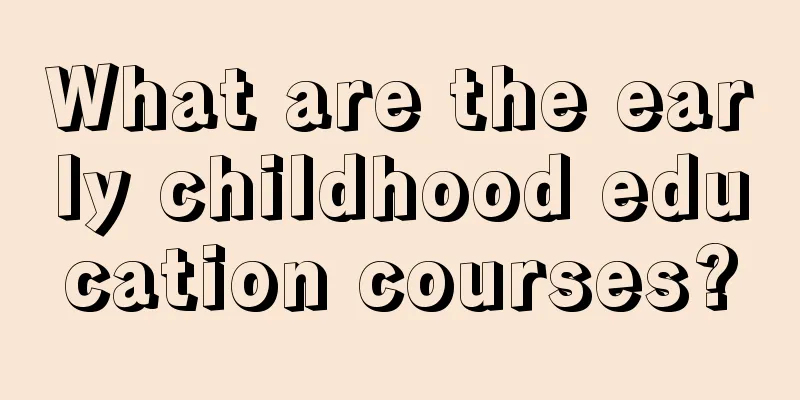What are the early childhood education courses?

|
Early childhood education institutions are emerging one after another, so what content does the curriculum of these early childhood education institutions include has become the most concerned issue for parents. The following will reveal to you one by one what exactly is learned in early childhood education centers and how to learn. Principles of Early Childhood Education1. Promote interests Children are still young, and parents cannot expect them to learn with willpower and effort, but can only educate them through their interests. As long as parents pay attention to their children's interests, they can think of many situations that can make their children full of fun and educate them at the same time. 2. Lifestyle It is best for children's early education courses to be close to life. Don't think that the courses are only related to books. For example, when it comes to toys, you can ask your baby what they are and what color they are. In this way, through exercise, the baby will learn more and more knowledge. 3. Educational Children at this age love to imitate, so adults need to pay attention to their behavior. For example, when taking children out to the street, throw the snack bags into the trash can, and guide children to love cleanliness and hygiene. After seeing this, children will have the awareness of protecting the environment in their minds. Early Childhood Education Course Introduction1. Enlightenment education Enlightenment education is mainly aimed at children aged 7-30 months. Children in this period are in the critical period of physical activities. Therefore, the main content of early education courses at this time is physical training, such as crawling, walking, running, jumping, kicking, speaking, etc. These trainings can make children's limbs more flexible and their articulation clearer. 2. Senses and mathematics Sensory and mathematical education is mainly for children aged 28-40 months. Parents can teach their children through small details in daily life. At this time, the child's brain development is in a very active state. It is a good time to recognize things and learn, and it is also a good time to improve the child's intelligence. 3. Art and Music Art and music are mainly for children over 16 months old. These early education courses are to cultivate children's interests. At this time, parents can buy some picture books and put them at home. Because the picture books are very colorful and have cute patterns, children will be very interested. As for music, you can play music at any time of the day or before the child goes to bed. The significance of early educationEarly childhood is a critical period for the development of intelligence in life. Grasping early education can improve learning outcomes. For example, some people believe that the best age for children to learn oral language is between 2 and 3 years old; foreign language learning should not exceed 4-5 years old at the latest, because at this time, children will not confuse foreign languages with their native languages; 5-5.5 years old is the best age to master the concept of numbers; 6 years old is the best age to develop size and direction perception. In 1964, Bloom, a famous psychologist at the University of Chicago, published the book "Stability and Change in Human Characteristics", which put forward the famous hypothesis of intellectual development: before the age of 5 is the fastest period for children's intellectual development. Mr. Hao Bin, a famous psychologist in my country, once said: "Early childhood education is the starting point of the entire education of life, and its educational goal should be to ensure the healthy development of children's body and mind and lay a solid foundation for further education." For this reason, the best period for early education in the early childhood education industry is 0-6 years old. Human intelligence or psychology is the result of the interaction between heredity and environment. Japanese scholar Kimura Kyuichi believes that children's potential ability follows a decreasing law, that is, if a child is born with 100 points of potential ability and receives ideal education from birth, he can become a person with 100 points of ability; if he starts education at the age of 5, he can only become a person with 80 points of ability; if he starts education at the age of 10, he can only become a person with 60 points of ability. Early education can promote brain development. Some parents worry that early education will damage their children's brains, but this worry is unnecessary. Some researchers have used animal brains and biochemical changes to show that early rich environmental stimulation and learning opportunities will not only not harm brain development, but will also promote brain development. Experts say that infancy is the period when a child's nervous system develops fastest and the development of various potentials is most critical, which is indeed a good time for education. According to the sensitive period and brain development theory, the sensitive period for human beings to develop various information and various abilities is concentrated in the first few years of life. This period is a unique and important development stage in a person's life, and it is also a window of opportunity for children's development, which is the best time for babies to gain wisdom. The core of early education is to provide an environment rich in educational nutrition, "activate" children's brain development and personality growth, and thus lay a solid foundation for their future development. American scientists have found in animal experiments that early education for owls can cause lasting physiological changes in their brains, so that the skills they learned in childhood can be preserved into adulthood. Scientists have inferred that early intelligence education for children will also leave a permanent mark in their minds. Wrong concept of early education1. Raising children completely according to the book Many young parents feed their children based on books. Some of them are too serious about implementing the requirements in the books, thinking that this is scientific. For example, the book says that babies can crawl at 8 months old and string beads at 18 months old. If their babies can't do it, they will be very anxious, thinking that there is a problem with the baby's intellectual development. In fact, the knowledge and requirements in the books may not be consistent with the actual situation of the children. Some may speak earlier, and some may walk earlier. Every baby's growth path is different. The correct approach: Use the book as a reference. If you feel that your baby is different from what is said in the book, don't be anxious. Consider the baby's development comprehensively. For example, is the baby unable to crawl because he is wearing too many clothes? Is the baby unable to speak because he has not been given the opportunity to speak? 2. There is no need to talk to a newborn baby Parents are the first teachers for children to learn language and have a profound impact on their children's language development. Experts on infant hearing have found that the "auditory map" in the infant's brain is completed around the age of one. During this period, the more meaningful sounds are delivered to the infant, the more the sensitivity of the neurons in the infant's brain responsible for hearing can be promoted. In addition, studies have shown that the amount of vocabulary acquired by infants depends largely on the amount of talk the mother has given the infant. Correct approach: When dressing your baby, feeding your baby, or changing his diaper, you should talk to your baby and tell him: "Mom is changing your clothes. Is it cold? Stretch your arms and raise your head." In other words, talk to your child as much as possible, which is essential for developing your child's language ability. When the time comes, the baby's language will suddenly burst out, and he will say a lot of words. 3. Child-centered Some parents will give the baby the delicious food first when they are eating, and the baby will not eat the food he likes. In this way, the baby will think that this is the only right way. If the parents eat the food he likes one day, he will cry. In addition, the baby will be self-centered when interacting with other children, thinking that only he is important. Such a baby will not know how to share and love. The right approach: Treat your baby as a member of the family. When eating, no matter whether the parents like it or not, let the baby share a portion with everyone, so that the baby can learn to share and understand care. 4. Overindulgence Sometimes, parents' careful care may "hurt" the baby. For example, some parents are always afraid that the baby will fall or get tired while walking, so they like to push the baby in a stroller or hold the baby. In this way, the baby's activity is small, and the coordination ability and large muscle exercise are not enough, so the mobility is particularly poor. The family always takes care of the baby's feeding, dressing, and tidying up toys, which will cause the child's hands-on ability and self-care ability to be poor; when the baby has a dispute with other children, the parents stand up and seek justice for the baby. This seemingly love for the baby will make the baby have poor living ability in the future and poor social skills and dare not face the outside world. In fact, children are amazingly adaptable. They need movement, communication, and even a little adventure to fully explore their potential. The correct approach: Let go of your baby's hand and let him put away his toys, eat by himself, and get up by himself after falling down. This will make your baby happier and have a greater sense of accomplishment. 5. Excessive authoritarianism Some parents think that disciplining a baby should start from childhood and make the baby absolutely obey their will. The baby wants a red toy, but the mother thinks the green one looks better, so she buys the green one. The baby wants to watch Teletubbies, but the mother thinks other historical stories are more meaningful. Everything is decided by the parents, and the baby has no choice. If he doesn't obey, he will be criticized. Over time, the baby will become timid and always feel suppressed, which limits the baby's intellectual development and makes the baby timid and afraid of things. The correct approach: If the baby’s request is reasonable, try to respect the baby’s choice and do not impose adult thinking on the baby. 6. Forcing things to grow Some parents have too high expectations for their baby's intellectual development and growth, and act too hastily in the process of educating their baby. They do not follow the laws of their baby's physical and mental development and intellectual growth, and "force the growth of seedlings", which often backfires, causing the baby to be overburdened and unable to adapt to the pressure, resulting in negative psychological tendencies and behaviors. For example, some parents let their 2-year-old baby learn English, and let their 3-year-old baby recite Tang poems and do math problems. This method is not worth promoting. Correct approach: For children, learning is playing. Playing with a ball can train the baby's eye, hand, and foot coordination, playing with building blocks can train the baby's creativity, and playing with inserts can train the baby's hands-on and brain-power abilities. These abilities are conducive to future knowledge learning. 7. No counting with fingers Some parents and kindergarten teachers, when teaching their babies to count, ask them to put down their hands and remember in their minds when they see them counting with their fingers. Psychologists say that this method of teaching babies to count is not scientific. Psychologists believe that the development of numerical concepts in children aged 2 to 5 usually starts with counting verbally, then counting physical objects. Next, the child can calculate the total number, and finally, pick up equal physical objects based on the abstract language numbers. For young children to master the initial concept of numbers, they need to go through a process from concrete to abstract. From concrete to abstract is the general process of young children forming various concepts about the things around them. Therefore, when teaching young children the concept of numbers, we must start from the concrete. Starting from the concrete means starting from contact with concrete things, from personally playing with, touching, and looking at concrete things to gain sensory experience in the number of objects. The richer this sensory experience of quantity is, the more conducive it is for young children to form abstract concepts of numbers. Correct approach: When counting, you might as well ask them to count fingers, buttons, toys, etc., and let them start with specific things. 8. Fulfill all your child’s wishes If the baby wants a certain toy or McDonald's, do parents have to satisfy him? Not necessarily. Unrestrainedly satisfying the child's demands will make the baby feel that everything is too smooth, and people often do not cherish things that are too easy to obtain, and the fun they get from them will also be gone. Correct approach: If your baby wants to buy a certain toy, you can tell him that if he insists on going to kindergarten for a week, he will buy it for him. If your baby wants to eat McDonald's, you can tell him that you will have a birthday party here on his birthday. This will give your baby a sense of anticipation and a desire to pursue. Parents should be careful to fulfill their promises and not lie to their babies. 9. Parents apologize on behalf of their baby When a two or three-year-old baby hits another and makes him cry, some parents will step forward and apologize for the baby. In this way, the baby will not recognize his own mistakes, and will not think that there is anything wrong with this. He will not take responsibility when he grows up. Correct approach: Parents should correct their baby in time when the baby does something wrong, because the baby does not know what is right and what is wrong, and parents need to guide the baby. Tell the baby that hitting others is wrong, and that he should apologize to others and let him bear the consequences. This will help him remember and understand right and wrong. 10. You play the good cop and I play the bad cop Some parents always cannot reach an agreement on educating their children, so they often have disagreements on the issue of educating their children. It is always the case that the mother punishes the child and the father intercedes for him; or the father gets angry at the child and the mother defends the child. Some parents will blame each other because of the problem of educating their children. In the long run, the child will not respect the parents, and the child will develop a speculative mentality, looking for whoever protects him. Correct approach: As a couple, you should be consistent in educating your baby, communicate more in private, and don't argue in front of the baby. When one person is educating the baby, even if what he says is wrong, the other party should not criticize in front of the baby. 11. Parental conflict does not affect babies Most parents know that arguing in front of school-age children is stressful for them, but many don’t realize that arguing in front of a newborn or pre-verbal baby can also affect the child’s thoughts or emotions. Psychologists have found in their research that when conflicts between parents escalate in the family, children between 8 months and 2 years old will become very anxious and know how to try to stop the conflicts between their parents. Children over 2 years old, after witnessing quarrels between their parents or strangers, will quickly imitate adults in talking and fighting aggressively when interacting with their peers, and their behavior will become very rude. This shows that parents should try to avoid quarreling in front of children of any age. Correct approach: When in front of the baby, parents should learn to control their emotions. If you feel that you can't control yourself, just leave the house and come back when you are calm. Don't make a fuss in front of the baby. 12. Material rewards Rewarding children is not inherently a bad thing, but you must choose wisely when, where and what kind of reward to use. If children expect to receive material rewards for everything they do, they will become discouraged when they do not receive material rewards. They may even think that things without material rewards are not worth doing. Material stimulation can indeed have a huge impact on children's behavior and make children highly motivated, but the effect is short-lived. Parents only consider the short-term effects of material stimulation on children, but do not consider the harm caused to children. In the long run, this method is bound to have adverse effects. When children receive multiple material stimulations, they will become more and more dependent on material stimulation, even when doing ordinary things. Therefore, parents should use material stimulation with caution, and use more spiritual encouragement methods to give children spiritual motivation. The correct approach: When the baby can get up on time and dress himself, parents should praise him in time, saying: "You are great!" or give him a kiss. |
<<: What are the benefits of toys for children? The significance of toys to children
Recommend
Can Shanghai sulfur soap be used to wash your face and remove acne? The efficacy and function of Shanghai sulfur soap
Shanghai Sulfur Soap is an old brand that every h...
How big of a baby is suitable for a sleeping bag?
It can be used as soon as the baby is born, and t...
What are the signs of a baby's good development? Three feelings of pregnant mothers indicate fetal health
The fetus and the mother are "connected in s...
What can children eat to gain weight? What should I do if my child is too thin?
Many children are thin, and mothers are worried ab...
Is it good for babies to drink yogurt? What effect does drinking yogurt have on babies' teeth?
Recently, the number of infants and young childre...
Will using musk perfume cause infertility in women? What is musk?
In the popular palace drama "Empresses in th...
Why do newborn babies have hangnails on their fingers? What is the reason?
Newborns are very curious and will grab interesti...
How old can baby rice cereal be eaten?
Rice cereal is a high-quality complementary food....
Are there any tips for losing weight during breastfeeding? Tips for losing weight during breastfeeding
Many mothers lose their body shape during pregnan...
What are the causes of nasal allergies in children and how to relieve them
Many children have allergic symptoms. In addition...
Is a baby who can't crawl not smart? Is a baby who can't crawl a sign of stupidity?
Usually, learning to crawl is the first step for ...
How three-year-olds develop and demonstrate self-independence
When the baby grows to three years old, he begins...
What are the two things that children should not eat for breakfast that affect their development?
The first is fried dough sticks, which have the r...
Talking about aesthetic education: understanding art from graffiti
In our understanding, aesthetic education should ...
What are the dangers of anemia in children? Is anemia a symptom of leukemia?
It is common for children to have anemia symptoms...









